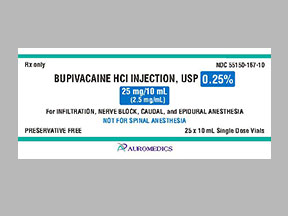
Marcaine Preservative Free Coupons & Savings Card – Discount Prices from $1.01
Brand for: Bupivacaine (pf)
Our Marcaine Preservative Free coupons are free to use. You can print the coupon, email it to yourself, or receive the Marcaine Preservative Free coupon via text message. To get your free discount, show the pharmacist your Marcaine Preservative Free savings card which has the discounted coupon price. Use our filters below to edit the prescription box to match your needs. The Marcaine Preservative Free prices will update based on your prescription needs. Above our Marcaine Preservative Free coupons, you can change the location to see pharmacy prices in other areas. Our prescription discount card will update online with the specific pharmacy costs associated with your edits. Be sure to text, email, or print the Marcaine Preservative Free savings card code that you need after editing the prescription box and location field. Show the discount card to your pharmacist before paying.
My prescription
Edit
10ML of 0.25%, Bupivacaine (pf) (1 Vial)
Select pharmacy

CVS
$20.37
COUPON PRICE
Walmart
$1.01
COUPON PRICE
Albertsons
$4.54
COUPON PRICE
Walgreens
$4.54
COUPON PRICEMarcaine Preservative Free savings card
Show this card to your pharmacist
Walmart
$1.01
BIN
ID
PCN
GRP
019876
LH0AC3BBB0
CHIPPO
LHX
Powered by
Our Marcaine Preservative Free coupons are free to use. You can print the coupon, email it to yourself, or receive the Marcaine Preservative Free coupon via text message. To get your free discount, show the pharmacist your Marcaine Preservative Free savings card which has the discounted coupon price. Use our filters below to edit the prescription box to match your needs. The Marcaine Preservative Free prices will update based on your prescription needs. Above our Marcaine Preservative Free coupons, you can change the location to see pharmacy prices in other areas. Our prescription discount card will update online with the specific pharmacy costs associated with your edits. Be sure to text, email, or print the Marcaine Preservative Free savings card code that you need after editing the prescription box and location field. Show the discount card to your pharmacist before paying.
Marcaine Preservative Free FAQs
Using the SaveHealth discount card, what is the price of Marcaine Preservative Free without insurance?
Using the SaveHealth discount card, the price of Marcaine Preservative Free without insurance is $1.01.
What is the price of Marcaine Preservative Free at CVS?
The price of Marcaine Preservative Free at CVS is $20.37.
What is the price of Marcaine Preservative Free at Walgreens?
The price of Marcaine Preservative Free at Walgreens is $4.54.
What is the price of Marcaine Preservative Free at Walmart?
The price of Marcaine Preservative Free at Walmart is $1.01.
